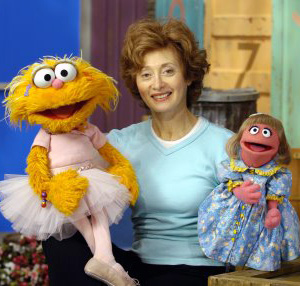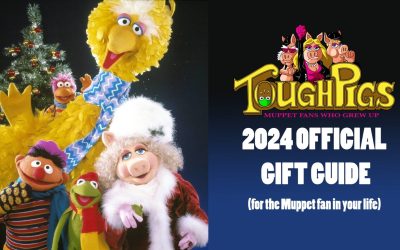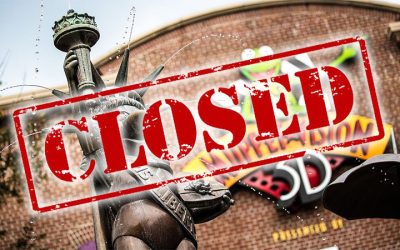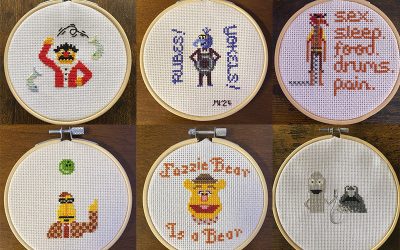Join us for a week-long celebration of Muppet performer Fran Brill! Fran recently announced her retirement from performing, so we’re dedicating a week’s worth of articles to her colorful career with Sesame Street and the Muppets.
Last month, we learned that Fran Brill has decided to retire from show business, effectively bringing to a close a 44-year career with the Muppets and Sesame Street. And that made us sad. But then we remembered that we had 44 wonderful years of Fran’s Brill-iance (sorry, sorry, I couldn’t resist), and that made us happy. Clearly we were very confused. So ToughPigs’ own Julia Gaskill and Matt Wilkie got together and had a long discussion about what Fran Brill means to each of them, as well as the Muppet community at large. So here is their talk on “The Legacy of Fran Brill!”
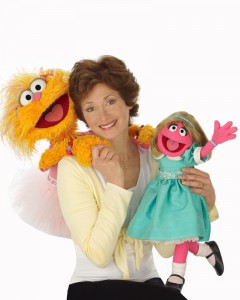 Julia Gaskill: So Fran Brill – greatest Muppet performer ever or greatest Muppet performer ever?
Julia Gaskill: So Fran Brill – greatest Muppet performer ever or greatest Muppet performer ever?
Matt Wilkie: She’s pretty high up there! I would definitely call her the greatest female Muppet performer ever! Would you agree?
Julia: I think I’d have to. A lot of other fantastic ladies come to mind, but – I mean – Fran’s really been there since the beginning. Or at least pretty close to the beginning!
Matt: Aside from Jane Henson, she’s the first lady Muppeteer we had. And consistently the longest running!
Julia: A lot of people forget that she was around for one of the original Muppet Show pilots, Sex and Violence, and even some of the Land of Gorch appearances they did on Saturday Night Live too. She really was a pioneer for female puppeteers.
Matt: And the very first years of Sesame Street. Aside from Caroll, she’s been on that show the longest as a puppeteer.
Julia: True! And over the years she’s played a lot of roles on Sesame; although, arguably her two most well-known ones would have to be Prairie Dawn and Zoe.
Matt: Meanwhile, we still had lots of female characters played by men. Which was still the case in many comedy troupes. Do you think of The Muppets as a troupe the way I do?
Julia: Y’know, I do, though I don’t think I’ve ever defined them as a troupe before right now. But they most certainly were – and still very much are. The Muppets definitely started out as a boys’ club, as many comedy troupes back in that time era did. To this day the more Muppet-y productions (i.e. Kermit and co.) are still, sadly, a boys’ club, wherein the few female characters we’re given are portrayed by dudes. Sesame’s definitely better in that aspect. At some point they started bringing in more female performers and creating more female characters, which was excellent of them. So, while still a troupe, a more inclusive troupe in this day and age.
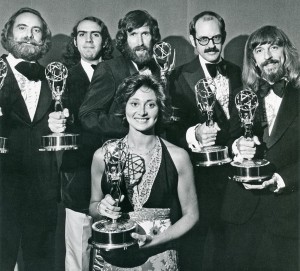 Matt: That’s an excellent point. The boys’ club problem was rampant in that day, with Monty Python being a prime example. Even though they had Carol Cleveland and Connie Booth, they were never given proper Python status. It carried through to today, looking at groups like The Kids in the Hall or The Whitest Kids Y’Know or The Birthday Boys.
Matt: That’s an excellent point. The boys’ club problem was rampant in that day, with Monty Python being a prime example. Even though they had Carol Cleveland and Connie Booth, they were never given proper Python status. It carried through to today, looking at groups like The Kids in the Hall or The Whitest Kids Y’Know or The Birthday Boys.
Julia: Hah! Monty Python was the first group that came to my mind when you mentioned comedic men taking on women’s roles. I’m fairly certain Eric Idle’s spent more time in a dress in his lifetime than I have.
Matt: There’s no rule that all-male groups are required to have female members, but with so many brilliantly funny women in comedy today, it’s a shame that groups exclude them and choose drag over, you know, actual women. But as much as The Muppets can fall into that trap, Sesame addressed that more directly, especially with Fran.
Julia: Yeah, I’m with you all the way. There are so many wonderfully hilarious women nowadays, and for some reason they still get left out. I do think there’s hope, with the Amy Poehler’s and Mindy Kaling’s of the world slowly taking a stand. Fingers crossed!
Anyway, not to stray too far off topic, Fran! While she wasn’t given a whole lot to work with in The Muppet productions, they definitely gave her plenty do over on Sesame Street. I think that’s where her puppeteering work really started to shine.
Matt: Absolutely! So the legend of Fran goes that she auditioned for The Great Santa Claus Switch and was hired with a few other puppeteers, including Richard Hunt. She was a voice-over actor and was new to puppetry but was a quick learner and Jim Henson took a shine to her. So when they were staffing up the second season of Sesame Street, Fran rose to the occasion. And it was in 1971 that her first major character (and only for a long time), Prairie Dawn was introduced. But not with much fanfare. Fran was mostly filling in wherever there was a “little girl” or “mom” needed, and she still wasn’t always the first choice for those roles. A lot of times, it was Frank Oz. It’s hard to imagine that day and age, the early ‘70s, but that was just how that was done for many jobs – choosing a man first. You and I weren’t watching (or born yet) at that time, but I’ll bet Prairie Dawn was a major inspiration for many young women at that time.
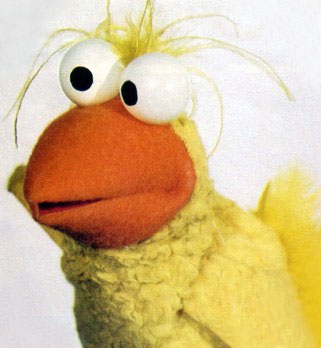 Julia: I imagine that’s incredibly true. I don’t have much of a relationship with the character of Prairie Dawn. While she’s still around, by the time I started watching Sesame as a child in the early 90’s there were a fair amount of other female characters, especially one little orange monster in a tutu (who we’ll get to in a bit). But Prairie Dawn being the first major character to be portrayed by a woman was definitely a step in the right direction for Sesame Street. I love Frank and Jerry, but the fact that they were playing the majority of female characters at the show’s start is a bit disheartening. I like to think that things have improved at least a bit since then, although it’s sad to realize there’s about three times as many male puppeteers on Sesame compared to females nowadays.
Julia: I imagine that’s incredibly true. I don’t have much of a relationship with the character of Prairie Dawn. While she’s still around, by the time I started watching Sesame as a child in the early 90’s there were a fair amount of other female characters, especially one little orange monster in a tutu (who we’ll get to in a bit). But Prairie Dawn being the first major character to be portrayed by a woman was definitely a step in the right direction for Sesame Street. I love Frank and Jerry, but the fact that they were playing the majority of female characters at the show’s start is a bit disheartening. I like to think that things have improved at least a bit since then, although it’s sad to realize there’s about three times as many male puppeteers on Sesame compared to females nowadays.
Matt: Why do you suppose that is? Do you think women inherently choose not to pursue puppetry for lack of interest or is it because they view it as a man’s world and they think they won’t have a shot even if their skills are top notch?
Julia: I’m not too sure, seeing as a lot of the people I’ve talked to in the last couple years who have shown interest in getting into puppetry have been women. I can’t imagine in this day and age that the idea of a profession being too much of a men’s game would deter women from trying. I’d like to think in a couple years we’ll be seeing more female puppeteers flourishing in the industry.
Despite the male to female puppeteer ration, Sesame does make an honest attempt to create an even amount of gendered characters for their audiences. Even though the male characters often end up being the more well received ones (Cookie Monster, Elmo, Big Bird, etc. etc.), we have seen some success of female characters, such as Abby Cadabby and Zoe.
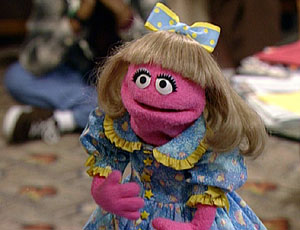 Matt: And to Sesame’s credit, that’s something they attempted very early on. It’s pretty much right in their mission statement – in addition to bringing all kinds of races (and species) to the forefront in homes all across the country – they introduced females like Prairie Dawn and Betty Lou very early in their run. Although Betty Lou was a little bit troubling in a way, seeing as how it was the exact same puppet as Prairie Dawn with a different hairstyle. But they were trying! They were conscious of the balance they wanted to strike.
Matt: And to Sesame’s credit, that’s something they attempted very early on. It’s pretty much right in their mission statement – in addition to bringing all kinds of races (and species) to the forefront in homes all across the country – they introduced females like Prairie Dawn and Betty Lou very early in their run. Although Betty Lou was a little bit troubling in a way, seeing as how it was the exact same puppet as Prairie Dawn with a different hairstyle. But they were trying! They were conscious of the balance they wanted to strike.
So the idea of striking oil didn’t always come through with the female characters as much as it did with the male ones, it wasn’t for lack of trying. And they still try to this day, always evolving their cast as much as possible to reflect the times.
Julia: Absolutely. In the last two decades I feel like all the characters they introduced that stuck around were pretty even on the female-male front. Nowadays we’re getting a pretty nice blend of characters, which is important.
Also, while not puppets, Sesame has always done an amazing job representing gender and race in their human cast. I will give them that. They’ve done a terrific job with representation over the years.
Matt: That’s definitely one of the reasons I believe they’ve lasted so long, that they’ve changed with the times and even gotten ahead of them in race/gender/religious diversity. We could go on and on about that, maybe in another discussion article. We’re so good at getting off-track! There are just so many layers to the Sesame world.
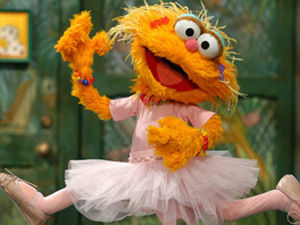 But to bring it back around to Fran, I want to get into what we thought would be the meat of this article: Prairie Dawn versus Zoe. I remember being in a supermarket and seeing all these magazine covers with Zoe on them, going on and on about how she was a new character and creating this big fanfare for her arrival, which hadn’t really been done with new characters on Sesame Street. Were you aware of that at the time of her premiere?
But to bring it back around to Fran, I want to get into what we thought would be the meat of this article: Prairie Dawn versus Zoe. I remember being in a supermarket and seeing all these magazine covers with Zoe on them, going on and on about how she was a new character and creating this big fanfare for her arrival, which hadn’t really been done with new characters on Sesame Street. Were you aware of that at the time of her premiere?
Julia: I was not aware of the humungous effort Sesame made to get Zoe’s name and face out there for their intended audience, but that’s probably because I was their intended audience. Zoe first came around in 1993 when I was three years old and definitely already hooked on Sesame Street. I was too young to really take into account any of the major Zoe-promotion done, but I was fully aware that there was a new female monster on my TV screen. I don’t think I ever really had a favorite character on Sesame as a kid, but I clearly remember loving Zoe. I was the target demographic the production company was going for, and gosh darn if I wasn’t completely won over by that fuzzy orange monster in a tutu.
Matt: Does your memory of Zoe always involve a tutu? I think it was almost ten years before she started wearing it.
Julia: Huh. It does, oddly enough. To be fair, I stopped watching Sesame on a regular basis around seven or eight, so that image of Zoe in her tutu probably comes from when I was older and started noticing more about Sesame. Funny, I always thought she had her tutu. Well, I guess the power of ballet wasn’t needed to woo me into adoring Zoe as a kid; I was already sold.
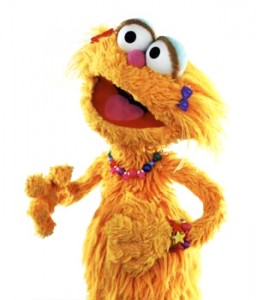 Matt: I don’t know what that says, but I find it interesting, the way our memories and perceptions warp a little with time. Because to me, it feels incredibly odd to think of Zoe with a tutu. My mind goes to bracelet and necklace Zoe.
Matt: I don’t know what that says, but I find it interesting, the way our memories and perceptions warp a little with time. Because to me, it feels incredibly odd to think of Zoe with a tutu. My mind goes to bracelet and necklace Zoe.
Julia: Do you remember your initial impressions of Zoe? With her being around the same age as me and being female, she made a great impression on me as a kid. I’m interested if she made any impact on you when you were younger?
Matt: I remember her more for the importance of her, the first time I was aware of those kinds of marketing things as a kid. I was eight when she was created, so I was just starting to grow out of Sesame Street. Truth be told, I was still watching it now and then, but secretly so my friends didn’t know. This was when Nickelodeon showed Muppet Show reruns and I really got heavily into the Muppets as a whole, but I was taking a lot of flack from friends who thought it was “for babies.” Like many ToughPigs I’ve heard about, there were many years that I hid my Muppet love. So Zoe was on my radar but I wasn’t tuning in to see her and her presence didn’t impact me as much as others. I was fascinated that there was so much being written about her and about Sesame Street, which felt strange to me for reasons I couldn’t pinpoint yet at that age.
There are many accounts of what went into the production of Zoe – in Sesame Street Unpaved and Street Gang to name a few – and I’d love to talk about that. Zoe is being created, and it’s a process. They went through all of these different designs and had a whole team of people influencing how she looked and what her personality might be. Fran talks about it a bit in Unpaved:
“From several possible designs of the character, ‘I picked the one that had a face like Carol Channing,’ says Fran Brill. ‘I wanted her to be obviously female with jewelry and barrettes in her hair. Someone suggested we call her Frannie, since that’s my nickname. But I didn’t want a Muppet with my name, so I thought of the J.D. Salinger book Franny and Zooey, and suggested Zoe, which seemed to be just right.”
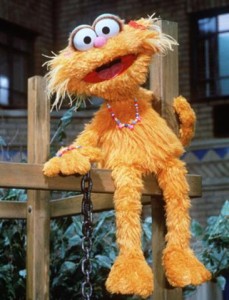 Julia: I didn’t know that she chose a puppet that “had a face like Carol Channing.” I love that! I did see an interview where Fran explained how Zoe got her name, which I thought was neat as well. So much awesome Zoe trivia going on right now!
Julia: I didn’t know that she chose a puppet that “had a face like Carol Channing.” I love that! I did see an interview where Fran explained how Zoe got her name, which I thought was neat as well. So much awesome Zoe trivia going on right now!
Matt: It’s cool to see that Fran was so involved in the process, and that she was pushing for it to be recognizably female. But what’s most interesting to me is how that kind of thing changed over time. In 1993, we were concerned with characters being distinctly female. Nowadays, we’re concerned with women characters being real and well-rounded and not forcing eyelashes and breasts onto cartoons and puppets so that it’s clear how they are female. We’re more focused on personality than appearance.
Julia: The push for a purposefully female character back in the early 90’s was definitely awesome, but I don’t think it was a humungous change. All the female characters that came before Zoe were inherently female. Prairie Dawn and Betty Lou were specifically made to be feminine, Alice and Rosita had bows in their hair, heck, even Grundgetta was rocking some grouchy jewelry. Where I feel that Zoe succeeds is that she’s distinctly female while simultaneously relatable to the three-to-five-year-olds watching her. The way she speaks, acts, and thinks are very childlike, which made her an easy favorite for a younger audience.
I agree that there’s a huge push for well-rounded female characters in television nowadays, which I am 100% in favor of (don’t even get me started or we’ll be here all day). That being said, the same idea that created Zoe (a clearly female character girls three to five can relate to) was pretty much the exact same concept used to create one of the most equally successful female Sesame characters on television today – Abby Cadabby. Abby’s not only pink like Prairie Dawn, she also has the pigtails and dress as well. Interestingly enough, Zoe and Abby are both three years old. So, even though there was a thirteen year gap between their first appearances, the two have quite a lot in common. Just aimed at different generations of little girls.
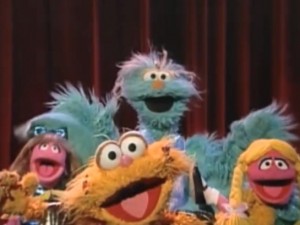 Matt: Do you think that if Prairie Dawn had been introduced today, in the same way, she would have caught on? No changes to her personality, just the time she was introduced.
Matt: Do you think that if Prairie Dawn had been introduced today, in the same way, she would have caught on? No changes to her personality, just the time she was introduced.
Julia: Prairie Dawn was obviously marketed for a very different era. While a great character who has stood the test of time and now has a wealth of great moments on the show, I don’t know if she would’ve caught on right away if introduced now. I’m not sure if the word “edgier” should ever really apply to Sesame, but I feel like they would’ve done something to make her pop more as a character.
… Or maybe that’s just the perception we have of what kids nowadays want to see on TV? For all we know, Prairie Dawn could be introduced as is and kids would still like her. It’s kind of hard to say.
Matt: I know I would! But I could see her being more direct, like Peggy Olson from Mad Men. Kids love Mad Men, right?
Julia: What five year old doesn’t love some casual sexism and drinking at the office? I know I sure did!
I could see Prairie being more direct if created now. While she definitely has a distinct personality already, they probably would’ve amplified a few of her characteristics. I could easily see her being a very Peggy-esque character.
Although now I’m wondering who’d be her Don Draper…
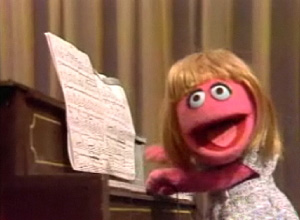 Matt: I could see Bert, trying to micromanage and take over the plays she’s directing and he’s producing.
Matt: I could see Bert, trying to micromanage and take over the plays she’s directing and he’s producing.
Julia: Hah!
Matt: So with everything we’ve talked about in mind, let’s talk about Fran as a performer. She’s got these two terrific characters, with separate and distinct personalities, and completely sells them both. Since she just decided to retire, what do we think that means for her characters? Are you pro-recasting? Should they both be saved from extinction?
Julia: I’d like to see them recast. As we said earlier, Sesame currently has some fine lady puppeteers up their sleeves. I think they’d be bound to find someone who could easily take over the roles (*cough*D’Abruzzo*cough*).
While Sesame has certainly worked hard to level the playing field of the male-female character ratio, it’d be a crying shame to lose both Zoe and Prairie Dawn. I’d find it hard for them not to recast Zoe, since she’s still such a popular character. Do you think Prairie Dawn will get recast, seeing as she is a bit older and hasn’t been around quite as much in the more recent years?
Matt: I think we’ll see Zoe again much sooner than Prairie Dawn. I think since she’s not as prominent nowadays anyway it’ll probably be a few years before we see her again, but she will reappear. Most likely with a terrific female puppeteer (*cough*D’Abruzzo*cough*) we already know and love.
But Zoe should be back soon. I think we’ll hear an announcement pretty soon about that, honestly. And I hope Fran sticks around and handpicks her replacement. I love when that happens.
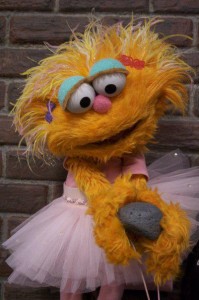 Julia: I hope we hear an announcement soon! Despite how sad Fran’s retirement may be, finding out recasts is always exciting. I’m sure Fran’ll have some say over her characters. She’s certainly been around long enough to warrant help making the decision!
Julia: I hope we hear an announcement soon! Despite how sad Fran’s retirement may be, finding out recasts is always exciting. I’m sure Fran’ll have some say over her characters. She’s certainly been around long enough to warrant help making the decision!
Matt: So with Fran retiring and her characters entering a new phase, whether it be fading away or coming back with a new performer and new life, what does Fran mean to you?
Julia: Fran’s a pioneer. She’s been there since the (almost) beginning, and has been such a huge influence of generations of young girls (and adults even, for all of us who still love her characters and are all grown). She’s just such a delight as both a performer and a person. Though it’s sad to see her leave the Street, she’s definitely made a huge impact and has shaped a lot of people’s lives for the better. Mine included! And you?
Matt: Fran is a delight! Even though I’ve never met her, I feel like I have from so many interviews and she’s always warm and open and that really shines through in her performances. She was a pioneer, that’s the number one word I’d use to describe her, too, and it’ll be sad to see her go. But we’ve got decades of footage we can watch and appreciate and marvel at for years to come. I hope that her impact shows in the next generation of female (and male!) puppeteers who could learn a lot from watching her perform and that whoever is chosen to carry on her legacy of characters lives up to her on and off screen.
Julia: Couldn’t have said it better myself!
Matt: Then I guess that all there is left to say is Thank You, Fran, for 44 wonderful years on Sesame Street! You’ve done so much for viewers of every age and we appreciate and love you!
Julia: Thank you so much, Fran, for everything!
Click here to to wear your tutu to the ToughPigs forum!
by Julia Gaskill and Matt Wilkie

